- Home
- Stephanie Bond
Body Movers Page 23
Body Movers Read online
Page 23
He sighed. “That’s right.”
“Did Angela know?”
“She found it…the morning she died.”
Carlotta closed her eyes. “That’s why she came to the store and accused me of having an affair with you.” And a few hours later, she was dead…murdered. The timing was suspicious at best.
“I’m so sorry. I never meant for her to see the picture.”
“That wasn’t fair to her. Or to me.”
“No, it wasn’t,” he agreed. “I was an idiot, withholding a piece of myself from my wife, and pining for a woman that I lost because of my own stupidity.”
“We’ve discussed this, and I told you that I understand why you did what you did. We have to put it behind us.”
He stared at their fingers twined together and gave a little laugh. “This brings back memories, huh? Being in a car together.”
She smiled. “The Crown Vic.”
“My dad’s hand-me-down. He couldn’t understand why I didn’t want a new sports car. He didn’t know that the back seat of the Vic was like a full-size bed.”
“Our Holiday Inn,” Carlotta said, her body warming at the memory of their progression from sweet kisses to heavy petting to the night he had taken her virginity with Rod Stewart’s “Have I Told You Lately That I Love You” playing on the stereo. Peter had been such a gentle, thorough lover. She’d never felt so completely connected to a person before…or since. Her eyes burned furiously as emotion overwhelmed her.
Peter shifted in his seat to face her in the semidarkness. “I love you, Carly. I never stopped loving you.”
His admission caused her breath to catch in her lungs. The times she had lain in bed and cried in her pillow, had he been equally miserable, but strapped with guilt and shame on top of having lost the woman he loved?
He reached for her and despite a tiny part of her conscience telling her to resist, she went to him. He slanted his mouth over hers and kissed her hungrily. She responded in kind, swept up in the sweet familiarity of Peter, of picking up where he had left her hanging emotionally over a decade ago. Peter moaned into her mouth, then wrapped his arms around her and pulled her over the console to straddle him. With her skirt pulled up, she settled onto his lap and lost herself in his arms. Nothing had changed. He still had the ability to make the rest of the world fall away. All that mattered was that they had found each other again.
A sharp rap on the window next to her brought her head up and around. Oh geez, it was probably Akin Frasier doing his rounds. While Carlotta scrambled to straighten her clothes, Peter wiped the steam they’d generated from the inside of the window. To her abject horror, Detective Jack Terry frowned in at them.
Peter uttered a curse, and Carlotta wondered hysterically if it were possible to actually die of humiliation. After Peter opened the door, he helped her out first, then climbed out after her, unaware that his hair stood on end from where she had run her fingers through it. Detective Terry stood there with his hands on his hips, wearing a bemused expression. “Sorry to interrupt you two lovebirds.”
“So why did you?” Peter asked hotly.
The detective frowned. “There’ve been reports of trouble in the parking garage. I was in the area and thought I’d cruise through. I recognized Ms. Wren’s car and saw the commotion inside and thought she was being assaulted.” He looked at her, his expression dark—and disgusted. “The car was bouncing, for heaven’s sake.” He nodded to her blouse, then averted his gaze.
She glanced down and gasped to see her button-up shirt gaping open, revealing her white lacy bra. She turned her back and fastened her shirt, feeling like a fool…and a slut.
“Do I have to tell you,” the detective practically bellowed, “how bad it looks for you two to be caught together right now?”
“No, you don’t,” Peter said, lifting his chin. “But I don’t care how it looks. I didn’t kill my wife.”
Detective Terry took a menacing step toward Peter. “If you don’t care how it looks on you, Ashford, think of how it looks on Carlotta.” He made a derisive noise. “For God’s sake, next time at least get a damn room.” Then he stalked away stiffly, opened the door to a dark, unmarked sedan. He hesitated, looking back at Carlotta with disapproval and—anger?—before swinging into his car, gunning the engine and driving away.
“I have to go,” she said to Peter absently, walking around to get back into her car.
“Carlotta—”
“Don’t, Peter,” she said, holding up her hand, her voice shaking. “Don’t.” She ignored the helpless look on Peter’s face, got into her car and, after grinding a few gears, pulled away. The entire way home, Carlotta’s skin stung with shame. What must Jack Terry think of her?
Whatever it was, it couldn’t be as bad as what she thought of herself.
Minus ten points, Carlotta.
25
W esley blinked at the pile of chips in front of him, so tired after thirty-six hours of cardplaying and so wired from all the caffeine he’d consumed, he was practically seeing double. The faint tolling of church bells was the only indication that Sunday morning had dawned. The basement of the Peachtree office building had no windows, one mark of a good card house. Casinos employed the same tactic to prevent gamblers from realizing just how much time had passed since they had entered the establishment.
Casinos also pumped uber-oxygenated air into their facilities to help keep gamblers awake and feeling fresh. The converted basement card room was not quite that advanced—the air was pungent from the industrial trash cans overflowing with discarded beer cans and take-out bags, from the smoke of about a thousand spent cigarettes (which probably violated numerous no-smoking ordinances), and from the unwashed bodies of the twenty-five players who had entered the tournament on Friday and who had, even after they’d been eliminated, stuck around to see who would make it to the final table.
The last five players standing would all be in the money, ranging from the top prize of twenty-five thousand down to three thousand. Four names had been written on a dry-erase board that had likely been filched from an accounting department. The fifth name would be either Wesley’s or the man sitting across from him—“Quinn,” a CFO of some tight-ass company who had so many facial tics, it was difficult to know what was a “tell” twitch and what was just the guy’s natural neuroses.
They shared their table’s $12,500 of chips, with Quinn having the slight advantage. But Wesley could sense that the guy was wearing down, taking longer and longer to make bets, his eyes and mouth drooping.
Time for the kill.
As the dealer shuffled, Wesley downed the rest of his third Red Bull in an hour and scanned the room.
A few feet away, his buddy Chance gave him a thumbs-up, his energy level suspiciously high—Wesley wouldn’t put it past him to have done a couple of lines of coke in the john. Besides making up the difference for Wesley’s buy-in, Chance had forked over the dough for his own spot in the tournament, too. But as much as Chance liked the action and the atmosphere of a card game, he was lousy at poker. Guys with big egos usually were. They sulked when they got bad cards and slapped backs when they got good ones. They also thought that drinking alcohol improved their judgment. That’s what Wesley liked most about the game of Texas Hold ’Em—it was the game of the underdog, the thinker, the mathematician.
His game.
“Post your blinds,” the dealer said, to call for the mandatory bet to initiate a hand. Dealers only had to “announce” in amateur gatherings like this one—at casino tables, the dealer rarely spoke.
It was his turn to post the “big” blind, set at two hundred dollars in this game. He pushed two hundred dollars’ worth of chips forward. Moving in slow motion, Quinn posted the “small” blind, set at one hundred. The advantage of Wesley having the big blind was that Quinn would have to place the first bet after the cards were dealt.
The dealer dealt them each two cards facedown, then tossed one into a discard pile.
Wesley
lifted the corner of his two cards, but instead of glancing down, he watched Quinn look at his cards, irritated when the man’s mouth twitched violently. Good? Bad? The beginning of an epileptic seizure?
Looking at his own cards, he willed himself not to react. Pocket kings, spades and clubs. Thankyou Jesus.
“Your bet, sir,” the dealer said, nodding to Quinn.
Quinn hesitated, then glanced at his cards again. “I’ll raise four hundred,” he said, then stacked the chips and pushed them forward.
Good. The man’s cards were strong enough to keep him in the game. For now, he’d slow-play Quinn to draw up the pot. Wesley fidgeted on purpose, then called the man’s bet and pushed forward three hundred in chips to make them even at five hundred all.
“Here comes the flop,” the dealer announced, then dealt three cards faceup on the table—the five of spades, seven of spades and king of hearts.
Three. Of. A. Kind.
He studied Quinn’s reaction to the flop, but the man was smothering a yawn and his eyes were watering. The best pocket cards Quinn could have were aces, which didn’t stand a chance against his own three kings. Or Quinn could be holding the other king and either a five or a seven, giving him two pairs, which still wouldn’t beat the three kings. With the five and seven community cards, he could be working a straight, or less likely, a straight flush if he held the eight and nine of spades.
Across the table, his opponent’s eyes were bleary and bloodshot. He looked like he wanted to quit and go home to his Sleep Number Bed. Quinn frowned, then put his hands on his chips. “I’ll bet a thousand.”
Wesley nodded thoughtfully. With that kind of a bet, the man must have the two pair, or, like him, three of a kind. But if so, the best three of a kind the man could have was sevens, and that wouldn’t beat his three kings.
He could practically smell the frankincense and myrrh.
The urge to raise was strong, but he resisted. “I’ll call,” he said, and added a thousand dollars’ worth of chips to the center.
“Here’s the turn card,” the dealer said, then flipped over the king of diamonds.
FOUR. OF. A. KIND.
Wesley tamped down his excitement, schooling his expression into a practiced mask, with a hint of a frown for good measure.
Across the table, Quinn rubbed his eyes with his palms, then said, “Oh, hell, I’m all in,” and pushed his chips toward the center. A murmur moved across the room, and a few people crowded closer.
Wesley waited for the hubbub to subside before he smiled. “Call.” Then he pushed the rest of his chips toward the center. With nothing left to bet and no card in the deck that could improve his hand, he turned over his pocket cards with a flourish, gratified at the crowd’s rousing reaction.
“Four kings!” Chance bellowed. “My buddy has four kings!”
Wesley almost felt sorry for Quinn…until the man turned over his cards: an eight and a nine of spades. With the five and the seven of spades from the community cards, that put him one card short of not just a straight, but a straight flush, one of only two hands that could beat four of a kind.
The crowd went crazy and Wesley swallowed hard. He was still in good shape—the man had only one “out” card to beat him, the six of spades. Including the discards between rounds, eleven cards had been dealt, leaving forty-one undealt. The chances of the next card being a six of spades was about two percent. On the other hand, the chances of the next card not being a six of spades was about ninety-eight percent.
If the next card was anything other than a six of spades, he’d won a seat at the final table, was guaranteed to go home with more money than he’d come with and had a good shot at the twenty-five grand. That kind of cash could make all his problems disappear, and put him back in Carlotta’s good graces.
If the card was a six of spades, he was out the one grand he needed to pay Tick on Tuesday, owed Chance fifteen hundred bucks, and Carlotta would flay the skin off his body with a stiletto heel.
“Here comes the river card,” the dealer said, then paused before turning the final card faceup on the table. Half the room erupted in cheers, half the room cried out in dismay.
Wesley stared down at the six of spades.
He was so fucked.
26
C arlotta looked over the dinner table at Wesley, who was moving the salmon with dill sauce around on his plate more than he was eating it.
She paused in her chewing—something was definitely wrong. When he’d come home yesterday, he’d gone straight to his room and spent the evening there, and since she’d arrived home from work today, he’d barely spoken more than a dozen words. She hadn’t pressed him because she’d been preoccupied with her own problems, but she was truly becoming concerned. Had he intercepted another postcard from their parents?
“The salmon is terrific,” she ventured.
“Thanks.”
“You’re not eating.”
He set down his fork and picked up his glass of iced tea. “Not hungry, I guess.”
She took another bite, chewed slowly, and swallowed. “How was your weekend?”
His hand tightened on the glass. “Fine. Yours?”
“Fine.”
They ate in silence for another minute or so, then Carlotta tried again. “How’s your job?”
“Good. Four pickups this morning, and I’m on call this evening.” His voice was low and indifferent.
She took another bite. “Thanks for doing the laundry.”
“No problem. I, um, noticed that there were some things missing from your closet when I set the basket on your bed.”
“Oh, I gave away a bunch of stuff Friday.”
He gaped. “You did?”
“Hey, I’m a charitable person.” Accidentally, but still.
Wesley resumed eating. “By the way, I found a man’s handkerchief in your laundry.”
She frowned, then her memory kicked in. “Oh, it’s Detective Terry’s.”
“Huh?”
“Don’t get any weird ideas. He loaned it to me the day of your arraignment.” But the thought of the man put her in an instant funk, and she wasn’t sure why. He already thought she was from bad stock, so why should she care what he thought of her lapse with Peter?
In her car.
In the parking lot where she worked.
With a man suspected of murdering his wife.
She pressed her fork on her mound of garlic mashed potatoes, flattening it. Christ, what had she been thinking? The detective was probably convinced that she and Peter had conspired to kill Angela.
“Are you okay?” Wesley asked.
Carlotta frowned. “I was getting ready to ask you the same thing.”
The chirping of his cell phone broke into the silence. He seemed relieved at the distraction and answered quickly. After a few cryptic “uh-huhs” and “okays” he disconnected the call and looked up, chewing his lip. “Got any plans tonight?”
“Why?” she asked warily.
“That was Coop. He’s at the scene of a murder, and wants me to meet him there if I can. Can you give me a lift?”
She set down her fork. “Not again. Good grief, Wesley—another murder scene?”
“A woman was strangled at Martinique Estates,” he said solemnly. “I thought you might be…interested.”
Her hand flew to her mouth. Peter’s neighborhood! She could only nod.
“Give me a few minutes to change.” Wesley’s chair scraped the floor, and he disappeared.
Carlotta sat frozen in her chair, considering the implications. Was a killer targeting women in the upscale subdivision? As awful as that would be, it would exonerate Peter in Angela’s death. Peter had mentioned that perhaps a stranger had murdered Angela. Maybe she’d simply been in the wrong place at the wrong time.
Pushing to her feet, Carlotta cleared their plates, her heart thumping and nerves tingling.
“Ready?” Wesley asked from the doorway.
She was still dressed in her work c
lothes, so all she had to do was grab her bag on the way out. As they drove toward the neighborhood in the falling darkness, Wesley turned to her and grinned. “This is kind of cool, us working together.”
She gave him a chastising look. “We’re not working together. I’m simply dropping you off.” And getting the scoop on what had happened.
“We could probably work independently for Coop, you know, as a brother-sister duo. All we need is a van. Hey, what about Hannah’s van? It’s even refrigerated!”
“Are you crazy? Her van is for storing food not cadavers.”
“Still, Coop is always looking for extra help.”
“Well, don’t give Hannah any ideas. She’s already fascinated by this stuff, and she doesn’t need any more creepy hobbies.”
“It’s really not too bad most of the time,” he said, cajoling. “Being around dead bodies kind of demystifies death.”
“I don’t mind being mystified. In fact, I prefer it. I’ve been to the morgue.”
He frowned. “When?”
“Last year when my friend Jolie dragged me there to identify her boyfriend’s body. They had him in a drawer, like some kind of human file cabinet.” She shuddered at the memory. “Besides, I have a job, remember?” Unless she got fired due to her plummeting sales. “By the way, how much was your check last week?”
“Uh…I’ve been wanting to talk to you about that.”
Dread filled her chest. “What is it?”
“Okay, don’t be mad.”
“What?”
He sighed. “I messed up.”
She gripped the steering wheel tighter. “Wesley, I swear I’m going to drive us straight into traffic if you don’t tell me what you don’t want to tell me.”
“The money’s gone.”
She tapped the brake, as if she could stop the words that had already come out of his mouth. “What happened to it?”
“I…lost it.”
“Lost it, as in dropped it down a manhole, or lost it, as in gambled it away?”
The look on his face told it all. “I’m sorry, sis.”
She closed her eyes for as long as she dared while driving, then counted to five to keep her fury at bay. “You promised me you would stay away from the card tables.”

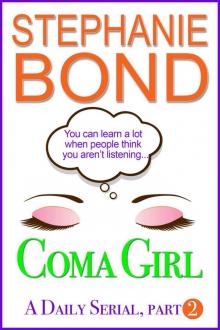 Coma Girl: part 2
Coma Girl: part 2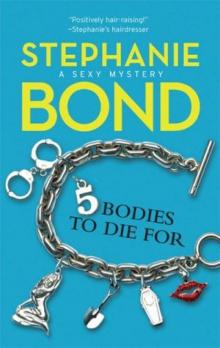 5 Bodies to Die For
5 Bodies to Die For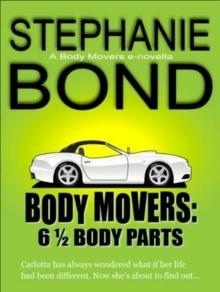 6 1/2 Body Parts
6 1/2 Body Parts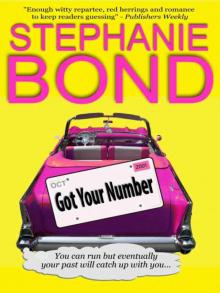 Got Your Number ((a humorous romantic mystery))
Got Your Number ((a humorous romantic mystery)) Baby, Hold On
Baby, Hold On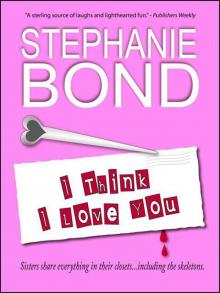 I Think I Love You
I Think I Love You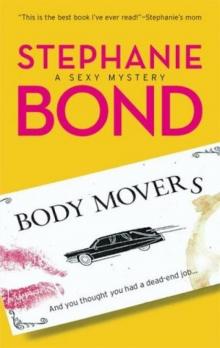 Body Movers
Body Movers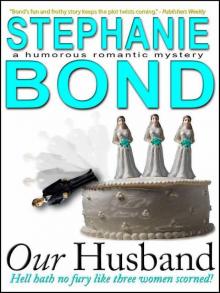 Our Husband
Our Husband Once Upon a Valentine
Once Upon a Valentine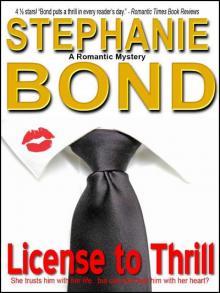 License to Thrill (a romantic mystery)
License to Thrill (a romantic mystery)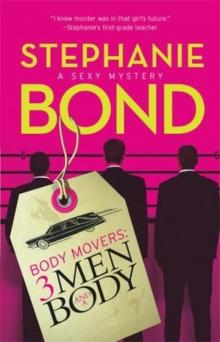 3 Men and a Body
3 Men and a Body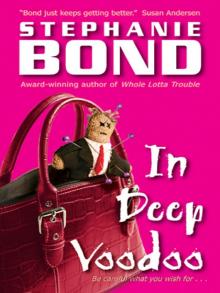 In Deep Voodoo
In Deep Voodoo Entice Me Box Set: The Truth About Shoes and MenCover MeMy Favorite Mistake
Entice Me Box Set: The Truth About Shoes and MenCover MeMy Favorite Mistake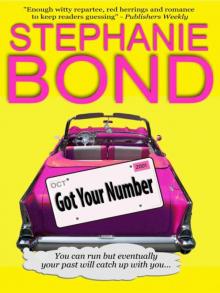 Got Your Number
Got Your Number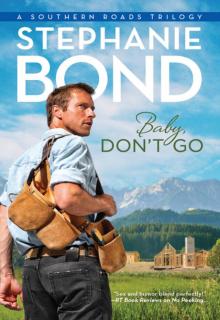 Baby, Don't Go
Baby, Don't Go Sand, Sun...Seduction!
Sand, Sun...Seduction! Wife Is A 4-Letter Word
Wife Is A 4-Letter Word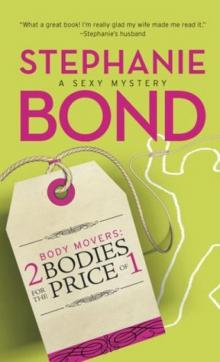 2 Bodies for the Price of 1
2 Bodies for the Price of 1 Baby, Drive South
Baby, Drive South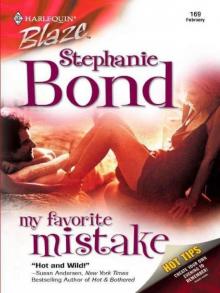 My Favorite Mistake
My Favorite Mistake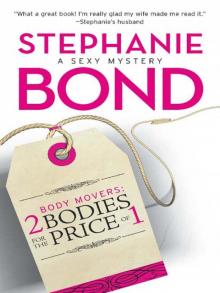 Body Movers: 2 Bodies for the Price of 1
Body Movers: 2 Bodies for the Price of 1 Coma Girl: part 1
Coma Girl: part 1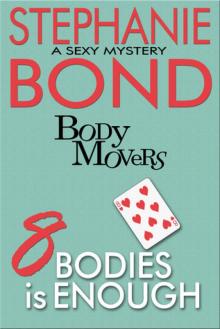 8 Bodies Is Enough
8 Bodies Is Enough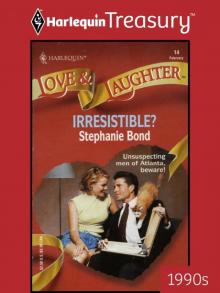 Irresistible?
Irresistible?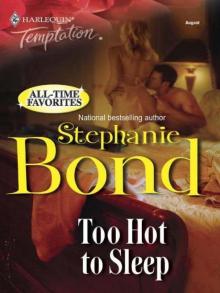 Too hot to sleep
Too hot to sleep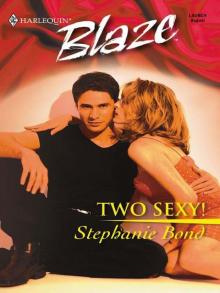 Two Sexy!
Two Sexy!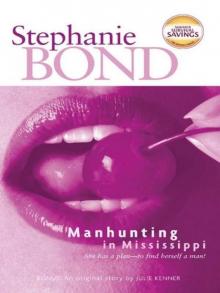 Manhunting in Mississippi
Manhunting in Mississippi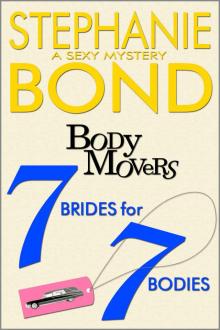 7 Brides for 7 Bodies
7 Brides for 7 Bodies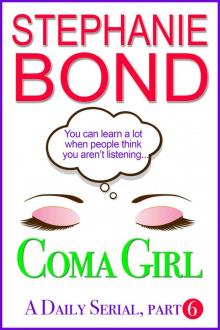 Coma Girl: Part 6 (Kindle Single)
Coma Girl: Part 6 (Kindle Single)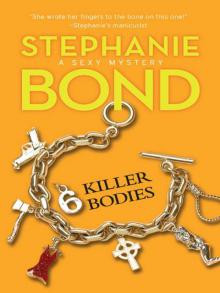 6 Killer Bodies
6 Killer Bodies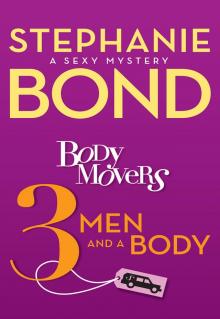 Body Movers: 3 Men and a Body
Body Movers: 3 Men and a Body Seeking Single Male
Seeking Single Male Love So Tender: Taking Care of BusinessPlay It Again, ElvisGood Luck Charm
Love So Tender: Taking Care of BusinessPlay It Again, ElvisGood Luck Charm Love Can Be Murder (boxed set of humorous mysteries)
Love Can Be Murder (boxed set of humorous mysteries)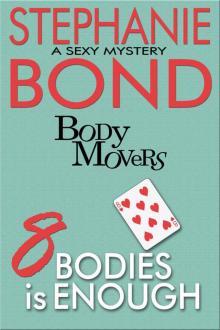 8 Bodies is Enough--for Amazon
8 Bodies is Enough--for Amazon Her Sexy Valentine
Her Sexy Valentine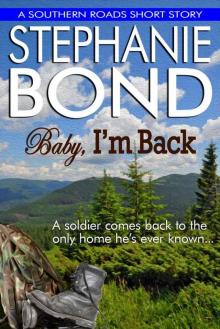 Baby, I'm Back (a Southern Roads short story)
Baby, I'm Back (a Southern Roads short story)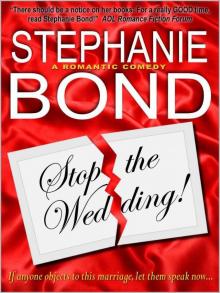 Stop the Wedding!
Stop the Wedding! Too Hot to Print
Too Hot to Print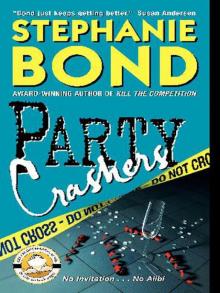 Party Crashers
Party Crashers Club Cupid
Club Cupid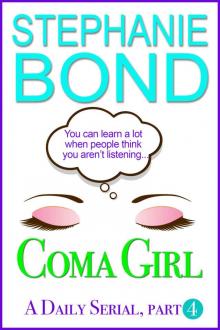 Coma Girl: Part 4 (Kindle Single)
Coma Girl: Part 4 (Kindle Single)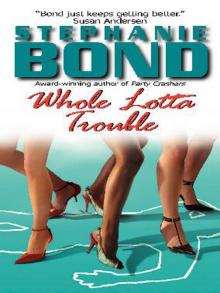 Whole Lotta Trouble
Whole Lotta Trouble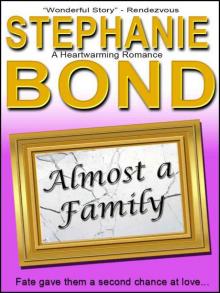 Almost a Family
Almost a Family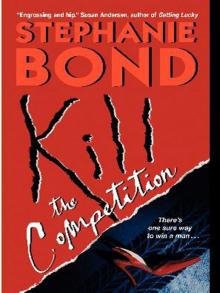 Kill the Competition
Kill the Competition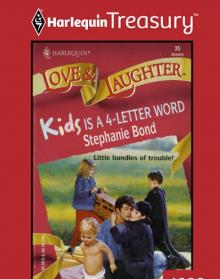 Kids Is A 4-Letter Word
Kids Is A 4-Letter Word Baby, Come Home
Baby, Come Home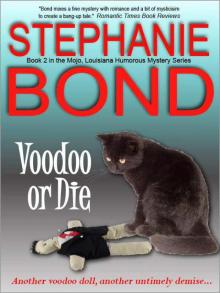 Voodoo or Die
Voodoo or Die Baby, I’m Yours
Baby, I’m Yours Mad About You (boxed set of beloved romances)
Mad About You (boxed set of beloved romances)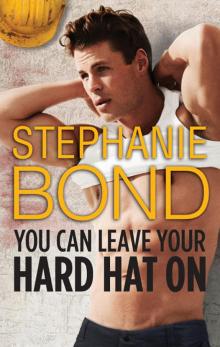 You Can Leave Your Hard Hat On
You Can Leave Your Hard Hat On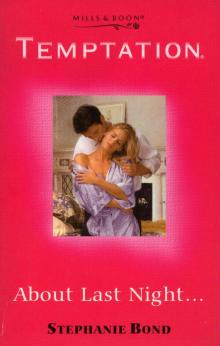 ABOUT LAST NIGHT
ABOUT LAST NIGHT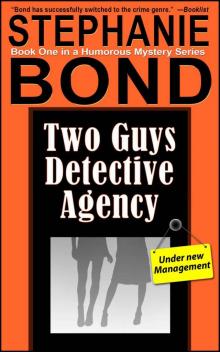 Two Guys Detective Agency (humorous mystery series--book 1)
Two Guys Detective Agency (humorous mystery series--book 1)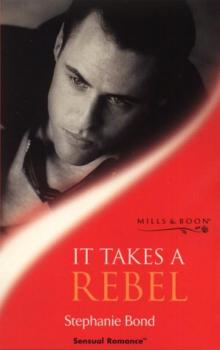 IT TAKES A REBEL
IT TAKES A REBEL Coma Girl: part 3 (Kindle Single)
Coma Girl: part 3 (Kindle Single)